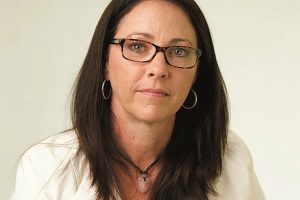It was more than a decade ago, but Melissa still vividly remembers the day she was held at gunpoint.
“It was a Tuesday, which is generally a quiet day,” she says. Melissa was bent over her desk at a bank on the north side of Brisbane, Australia, when she heard someone approach her. She looked up to see a gun pointed at her face. The man holding it demanded money and threatened Melissa’s life

After being robbed twice, Melissa was able to find healing through Prison Fellowship Australia’s Sycamore Tree Project. (Photo: Nick Paton)
“The first thing that went through my mind … was, Will I see my kids again?”
Melissa walked away unharmed, and took some time off work to collect herself. When she returned on her first day, four weeks later, she found herself the victim of yet another armed robbery. This time, the offender was armed with a knife.
Melissa fell apart.
She quit her job and spent years in deep depression, afraid she would find herself in a similar situation, but would not survive a third time. It wasn’t until she began sharing her story that Melissa was able to put her life back together.
“You changed my whole view of the world forever,” she wrote in a letter to her offender. “I lost years of my life. I prayed for the world to stop. The world kept spinning and while others lives thrived, mine stood still.”
Melissa’s letter is part of a healing and rehabilitative exercise through Prison Fellowship Australia’s Sycamore Tree Project®, an eight-week restorative justice program developed by Prison Fellowship International’s Centre for Justice & Reconciliation. The program brings together victims and offenders of unrelated crimes to talk about their experiences and make amends.
“This was the first time anyone had ever listened to my story … and validated it,” says Melissa.
A key component of the Sycamore Tree Project is helping prisoners understand the impact of their crime and its consequences. The course walks prisoners through conversations about personal responsibility, confession, repentance, forgiveness, making amends, and reconciliation, and it gives victims a voice. As offenders listen to victims share their stories, they have the opportunity to understand the personal impact on those they’ve hurt.
Robert, an inmate in Gatton Correctional Centre, Queensland, Australia, said this was “the first time I’ve ever done anything behind bars that made me think about what I’ve done.”
A prisoner in Western Australia said, “Today I look in the mirror and I see an offender who wants to change … I look in the mirror and I see myself, hungry for the healthy lifestyle, hungry for a peace.”
Another inmate vowed, “Saying thank you isn’t enough. The way I am going to show you my gratitude is to never offend again.”
Melissa was able to witness these powerful, transformational moments in prisoners’ hearts and attitudes.
“They all said they never understood, or couldn’t comprehend that a victim of a robbery would be impacted … they were quite shocked to hear that it changed my life.”
Melissa said she is humbled by the participants’ commitment to the program, and for their humility, respect, and remorse. She continues to tell her story, and now works in restorative justice for youth, giving young victims like her a voice. She says it’s her hope that one day all victims of crime will be granted the opportunity to sit across from the person who hurt them.
“The power of this experience is far tougher … than any sentenced ever passed down.”
Prison Fellowship International works in 119 countries outside the United States. To learn more, visit pfi.org.